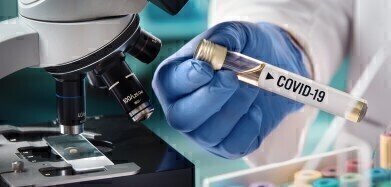News & Views
Queen’s to Investigate Coronavirus Blood Vessel Damage
Jan 17 2021
Science Foundation Ireland and the Northern Ireland Department for the Economy has awarded a grant to Queen’s University Belfast to research how COVID-19 damages blood vessels. The research project will be led by Professor Alan Stitt from Queen’s University Belfast and Dr Roger Preston from The Royal College of Surgeons in Ireland (RCSI).
As well as affecting lungs COVID-19 can also damage blood vessels elsewhere in the body and the study will look into what happens to endothelial cells (that normally line blood vessels) when they are infected with the coronavirus. With a particular emphasis on inflammation and blood clot formation in the brain and retina, which could lead to serious damage and stroke the study will help to inform treatment strategies to protect blood vessels from COVID-19, and thereby help to avoid serious symptoms.
Professor Alan Stitt, lead researcher on the study and Dean of Innovation and Impact within the Faculty of Medicine, Health and Life Sciences at Queen’s University Belfast, said: “We are delighted to participate in this North-South research collaboration between Queen’s University and RCSI. We know that COVID-19 has a profound impact on the blood vessels of the central nervous system although the precise mechanisms of how this coronavirus causes damage in these organs remains ill-defined.
“This project seeks to decipher the molecular mechanisms that underpin vascular damage in the brain and retina, with a particular focus on the clotting system in these fragile vessels. This research will seek to understand why the brain and retina are susceptible to vascular damage in some COVID-19 patients and identify novel therapeutic pathways that can protect against stroke and ischaemic retinopathies.”
Roger Preston, lead researcher on the study and Senior Lecturer from RCSI School of Pharmacy and Biomolecular Sciences, said: “COVID-19 can damage blood vessels throughout the body to cause serious, life-threatening disease. It is also possible that blood vessel damage caused by COVID-19, particularly in the central nervous system, contributes to the chronic symptoms experienced by many patients.
“How COVID-19 causes blood vessel injury is still, however, poorly understood, slowing the development of new treatments. To address this, our research team based at RCSI and Queen’s University Belfast will investigate how blood vessel cells are affected by coronavirus infection, with the goal of developing new therapeutic strategies to manage both the acute and long-term consequences of COVID-19.”
Digital Edition
ILM 49.5 July
July 2024
Chromatography Articles - Understanding PFAS: Analysis and Implications Mass Spectrometry & Spectroscopy Articles - MS detection of Alzheimer’s blood-based biomarkers LIMS - Essent...
View all digital editions
Events
Jul 28 2024 San Diego, CA USA
Jul 30 2024 Jakarta, Indonesia
Jul 31 2024 Chengdu, China
ACS National Meeting - Fall 2024
Aug 18 2024 Denver, CO, USA
Aug 25 2024 Copenhagen, Denmark


.jpg)

24_06.jpg)













